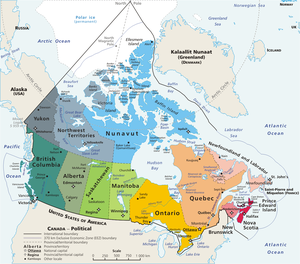 Image via Wikipedia
Image via WikipediaCanada’s immigration policy: Who is on the guest list?
This week, the Minister of Immigration and Citizenship rightly noted thatimmigrants are Canada’s ticket to economic growth in the coming years.
The untold story is this: Canada’s growing reliance on newcomers is increasingly turning to temporary foreign workers -- “guest workers” -- rather than new immigrants and future citizens to propel growth.
The rise in the number of temporary foreign workers has accelerated over the past decade, most rapidly since 2006. Today their ranks eclipse those of economic immigrants.
"The temporary foreign worker program is really about contracting out immigration," says Yessy Byl, a lawyer who volunteers with the Edmonton Community Legal Centre. “In fact the government is setting the stage for a
 Image via Wikipedia bizarre non-immigration program because those workers can’t immigrate.”
Image via Wikipedia bizarre non-immigration program because those workers can’t immigrate.”
 Image via Wikipedia bizarre non-immigration program because those workers can’t immigrate.”
Image via Wikipedia bizarre non-immigration program because those workers can’t immigrate.”Whether unintentional or not, the shaping of public policy seems to be increasingly off-loaded to private sector interests rather than handled by those charged with addressing the public interest, which include but are broader than employers’ needs.
Local economic needs are an important factor in shaping immigration policy, and the involvement of employers can and should reduce skill mismatches.
But there’s a danger in allowing employers, alone, to define Canada’s immigration policy: Employers are increasingly looking for average workers, not skilled labour.
Cheap labour, that is. Workers who increasingly depend on the goodwill of their employer rather than the rule of law.
This week, the Law Commission of Ontario, in its ongoing efforts to make the law accessible to all residents, started looking at what can be done about the rise of vulnerable workers.
By allowing employers to drive the agenda based on their own short-t
 Image via Wikipediaerm interests, the federal government has dropped the ball on Canada’s long-term interests and has taken immigration policy down a troubling path: the normalization of migrant labour in Canada.
Image via Wikipediaerm interests, the federal government has dropped the ball on Canada’s long-term interests and has taken immigration policy down a troubling path: the normalization of migrant labour in Canada.
 Image via Wikipediaerm interests, the federal government has dropped the ball on Canada’s long-term interests and has taken immigration policy down a troubling path: the normalization of migrant labour in Canada.
Image via Wikipediaerm interests, the federal government has dropped the ball on Canada’s long-term interests and has taken immigration policy down a troubling path: the normalization of migrant labour in Canada.For a country that has grown into one of the most diverse, peaceful and prosperous nations on the planet, this shift in immigration policy signals a troubling new direction.
 Image by Mr Miyagi via Flickr
Image by Mr Miyagi via FlickrDemocracy Now!
Ex-CIA Analyst Ray McGovern Beaten, Arrested for Silent Protest at Clinton Speech
This week, U.S. Secretary of State Hillary Clinton gave a major address calling for Internet freedom around the world. As Clinton condemned the Egyptian and Iranian governments for arresting and beating protesters, former U.S. Army and CIA officer Ray McGovern was violently ejected from the audience and arrested after he stood up and turned his back in a silent protest of America’s foreign policy.
- Richard Holbrooke Dies at 69: Remembering Veteran Diplomat’s Overlooked Record in East Timor, Iraq and the Balkans
- Chalmers Johnson, 1931-2010, on the Last Days of the American Republic
- New $600B Fed Stimulus Fuels Fears of US Currency War
- Noam Chomsky on Obama’s Foreign Policy, His Own History of Activism, and the Importance of Speaking Out
- "Stripping Bare the Body: Politics, Violence, War": Groundbreaking Journalist Mark Danner on Haiti, the Balkans, Iraq and Torture
- Uprising in Wisconsin: Tens of Thousands Protest Anti-Union Bill, as Wisconsin Lawmakers Leave State to Stall Vote
- "A Celebration, Not a Protest": Massive Crowd Packs Cairo’s Tahrir Square to Mark One Week Since Mubarak’s Ouster
- "It’s Time to Push the Borders of Freedom": Egyptian Students Defiantly Publish Newspaper Without Government Permission
- Egyptian Uprising Fueled by Striking Workers Across Nation
Dumping The U.S. And Circumventing Its Veto
Of all the Kakfa-esque aspects to the spectacle of the U.S. vetoing yesterday a U.N.S.C. draft resolution that was worded specifically to reflect U.S. stated policy on the settlements, one that struck me was the realization that the U.S. seems completely oblivious to how irrelevant its passionate attachment to Israel has made it in the eyes of that 96% of the world's population that happens to be neither American nor Israeli.
President Obama and Secretary Clinton were trying to cajole/threaten Mahmoud Abbas into withdrawing the resolution, waving promises of more strongly-worded Quartet statements like trappers dangling shiny beads before the natives, and threats about withdrawal of economic aid which would make the P.A. collapse. And he ignored them.
The P.A. picked up the economic threats and ran with them this morning; suggesting that maybe they'd take the lead and disband themselves, seeing as a P.A. that exists in the absence of any progress towards independence has no raison d'etre, and in practice serves only to serve the status quo which suits the occupier and its enablers... So even the P.A. doesn't take us seriously. We stopped being indispensible to one of our own clients, and we didn't even notice.
What does the Arab world do when its water runs out?
Poverty, repression, decades of injustice and mass unemployment have all been cited as causes of the political convulsions in the Middle Eastand north Africa these last weeks. But a less recognised reason for the turmoil in Egypt, Tunisia, Algeria, Yemen, Jordan and now Iran has been rising food prices, directly linked to a growing regional water crisis.
The diverse states that make up the Arab world, stretching from the Atlantic coast to Iraq, have some of the world's greatest oil reserves, but this disguises the fact that they mostly occupy hyper-arid places. Riversare few, water demand is increasing as populations grow, underground reserves are shrinking and nearly all depend on imported staple foods that are now trading at record prices.
For a region that expects populations to double to more than 600 million within 40 years, and climate changeTM to raise temperatures, these structural problems are political dynamite and already destabilising countries, say the World Bank, the UN and many independent studies.
In recent reports they separately warn that the riots and demonstrations after the three major food-price rises of the last five years in north Africa and the Middle East might be just a taste of greater troubles to come unless countries start to share their natural resources, and reduce their profligate energy and water use.
Oldest Fossils of Large Seaweeds, Possible Animals Tell Story About Oxygen in an Ancient Ocean
Almost 600 million years ago, before the rampant evolution of diverse life forms known as the Cambrian explosion, a community of seaweeds and worm-like animals lived in a quiet deep-water niche under the sea near what is now Lantian, a small village in Anhui Province of South China. Then they simply died, leaving some 3,000 nearly pristine fossils preserved between beds of black shale deposited in oxygen-free waters.
THE OUTFALL OF A HELIUM-3 CRISIS
The United States is currently recovering from a helium isotope crisis that last year sent low-temperature physicists scrambling, sky-rocketed the cost of hospital MRI’s, and threw national security staff out on a search mission for alternate ways to detect dirty bombs.
- Trade Secrets: What Companies Don't Want You to Know: Slide Show
- A Cure for Baldness?
- Primitive Dinosaur Found in Antarctic Mountains
- Monster Solar Flare Jams Radio Signals
- Young People Reaching 'Adulthood' Later
- Faces of Our Ancestors
- 10 Trickiest Spy Gadgets Ever
- X PRIZE Lunar Race Lures 29 Contenders
- Reporter's Gibberish Reveals Migraine's Complexity
- Priceless Pharaoh Statue Found Near Garbage Can
MODERN SOCIETY THREATENED BY SOLAR STORMS
The Earth just dodged a solar bullet, but what about next time? Sensitive technology could be mankind's Achilles heel.
Modern society is increasingly vulnerable to space weather because of our dependence on satellite systems for synchronizing computers, navigational systems, telecommunications networks and other electronic devices.A potent solar storm could disrupt these technologies, scorch satellites, crash stock markets and cause months-long power outages, experts said Saturday at the American Association for the Advancement of Science's annual meeting.The situation will only get more dire because the solar cycle is heading into a period of more intense activity in the coming 11 years.
Obama is hurting Israel by supporting settlements - Ha'aretz
The HinduObama is hurting Israel by supporting settlementsHa'aretzAn America that...ShareAfter 42 years, Libya's controversial ruler faces new threats - CNN International
Telegraph.co.ukAfter 42 years, Libya's controversial ruler faces new threatsCNN...ShareBahrain unrest: Protesters reoccupy Pearl Square - BBC News
Globe and MailBahrain unrest: Protesters reoccupy Pearl SquareBBC NewsThousands of...Share



















No comments:
Post a Comment